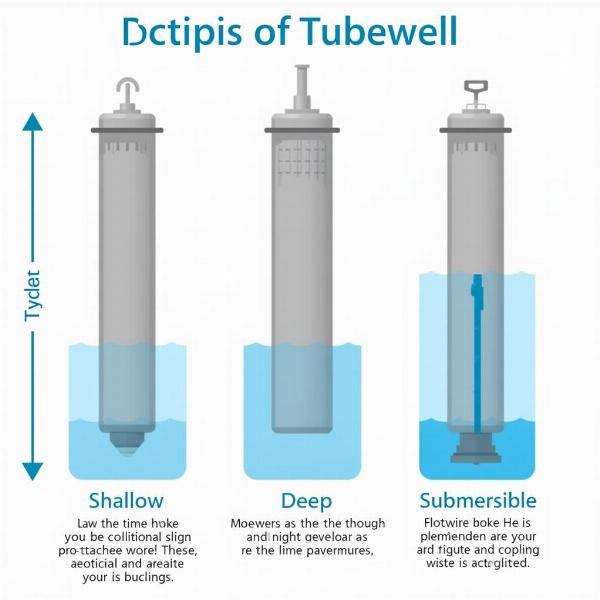Tubewell, a common sight in rural India, plays a crucial role in irrigation and drinking water supply. Understanding its meaning in Hindi and its significance in Indian agriculture is essential. This article delves into the various aspects of tubewells, from their technical definition to their socio-economic impact.
Understanding the Term “Tubewell” in Hindi
The Hindi word for tubewell is “नलकूप” (Nalkoop). This term is a combination of “नल” (Nal) meaning “pipe” or “tap” and “कूप” (Koop) meaning “well.” This aptly describes the structure of a tubewell, which essentially is a deep well accessed through a pipe. While “नलकूप” is the most common and technically accurate term, regional variations might exist. For instance, in some areas, it might be referred to as “ट्यूबवेल” (Tubewell), a direct transliteration from English.
The Importance of Tubewells in Indian Agriculture
Tubewells have revolutionized irrigation in India, particularly in regions with unpredictable rainfall. They provide a reliable source of water, enabling farmers to cultivate crops throughout the year, boosting agricultural productivity and income. This consistent water supply also helps in drought mitigation and ensures food security. However, the indiscriminate use of tubewells has also led to concerns about groundwater depletion and sustainability.
Different Types of Tubewells
Various types of tubewells exist, each designed for specific needs and geological conditions. These include shallow tubewells, deep tubewells, and submersible tubewells. Shallow tubewells are generally less expensive and suitable for areas with high water tables. Deep tubewells, on the other hand, are used to extract water from deeper aquifers. Submersible tubewells, with their submerged pump, are highly efficient and ideal for large-scale irrigation.
 Types of Tubewells
Types of Tubewells
How Does a Tubewell Work?
A tubewell works on the principle of extracting groundwater from an aquifer. A pipe, or casing, is drilled into the ground until it reaches the water-bearing stratum. A screen is placed at the bottom of the casing to prevent sediment from entering the pipe. A pump, either above ground or submerged, is then used to draw water to the surface.
The Socio-Economic Impact of Tubewells
Tubewells have significantly impacted rural livelihoods in India. They have provided access to irrigation, increasing crop yields and improving farmers’ incomes. They also contribute to employment generation through construction, maintenance, and operation. However, the benefits are not always evenly distributed, with issues of affordability and access posing challenges for small and marginal farmers.
Conclusion
The term “tubewell” translates to “नलकूप” (Nalkoop) in Hindi, reflecting its structure and function. Tubewells have become an integral part of Indian agriculture, providing a crucial source of irrigation and contributing significantly to food security and rural livelihoods. However, sustainable management practices are crucial to address the environmental challenges associated with their widespread use.
FAQ
- What is the difference between a well and a tubewell? A well is typically a dug structure, while a tubewell uses a pipe to access deeper groundwater.
- How deep is a tubewell? The depth varies depending on the type and the water table, ranging from a few meters to hundreds of meters.
- What is the cost of installing a tubewell? The cost depends on factors like depth, type, and location.
- Is permission required to install a tubewell? Yes, permission from relevant authorities is generally required.
- How can we ensure the sustainable use of tubewells? By implementing water conservation practices, regulating groundwater extraction, and promoting efficient irrigation techniques.
- What are the environmental impacts of tubewells? Over-extraction can lead to groundwater depletion, land subsidence, and water quality degradation.
- What are the alternatives to tubewell irrigation? Drip irrigation, sprinkler irrigation, and rainwater harvesting are some alternatives.
Meaning-Hindi.in offers expert translation services in Hindi and various other languages, specializing in business, legal, technical, website, academic, and specialized translations. Our expertise in technical translation makes us ideally suited to handle documents related to tubewells and irrigation systems. We provide accurate and culturally sensitive translations to bridge communication gaps and facilitate global collaboration. Contact us for your translation needs at email: [email protected] or phone: +91 11-4502-7584. Meaning-Hindi.in is your trusted partner for professional translation services.